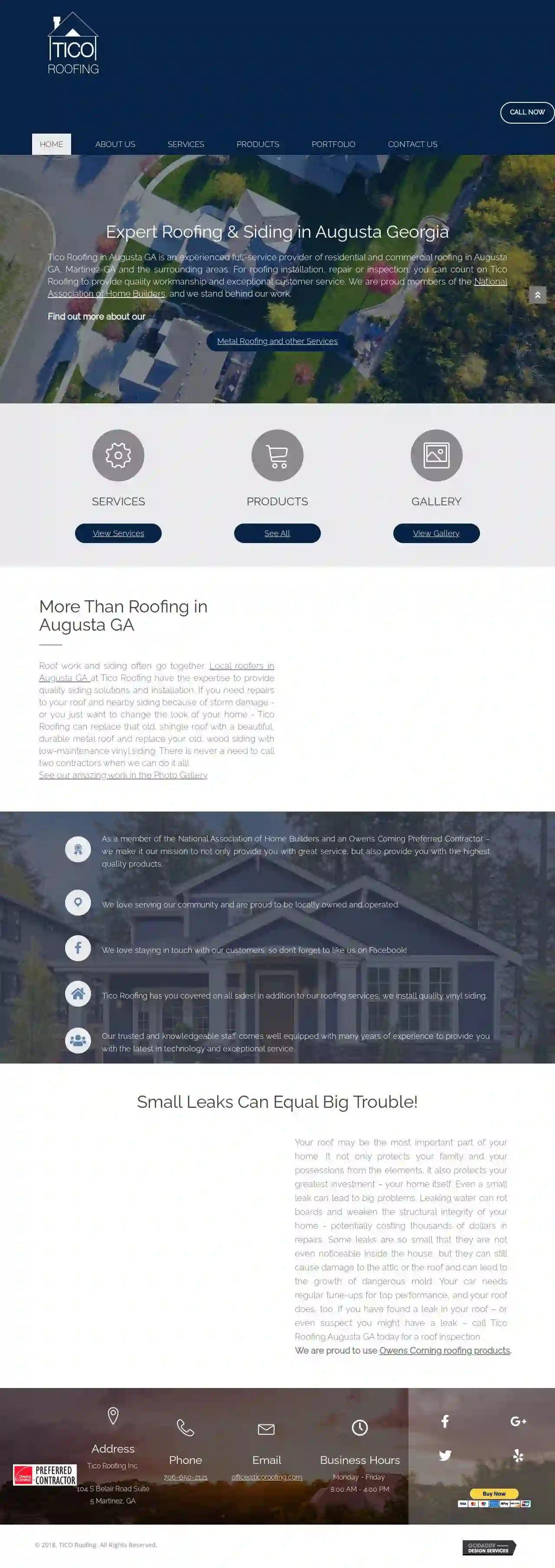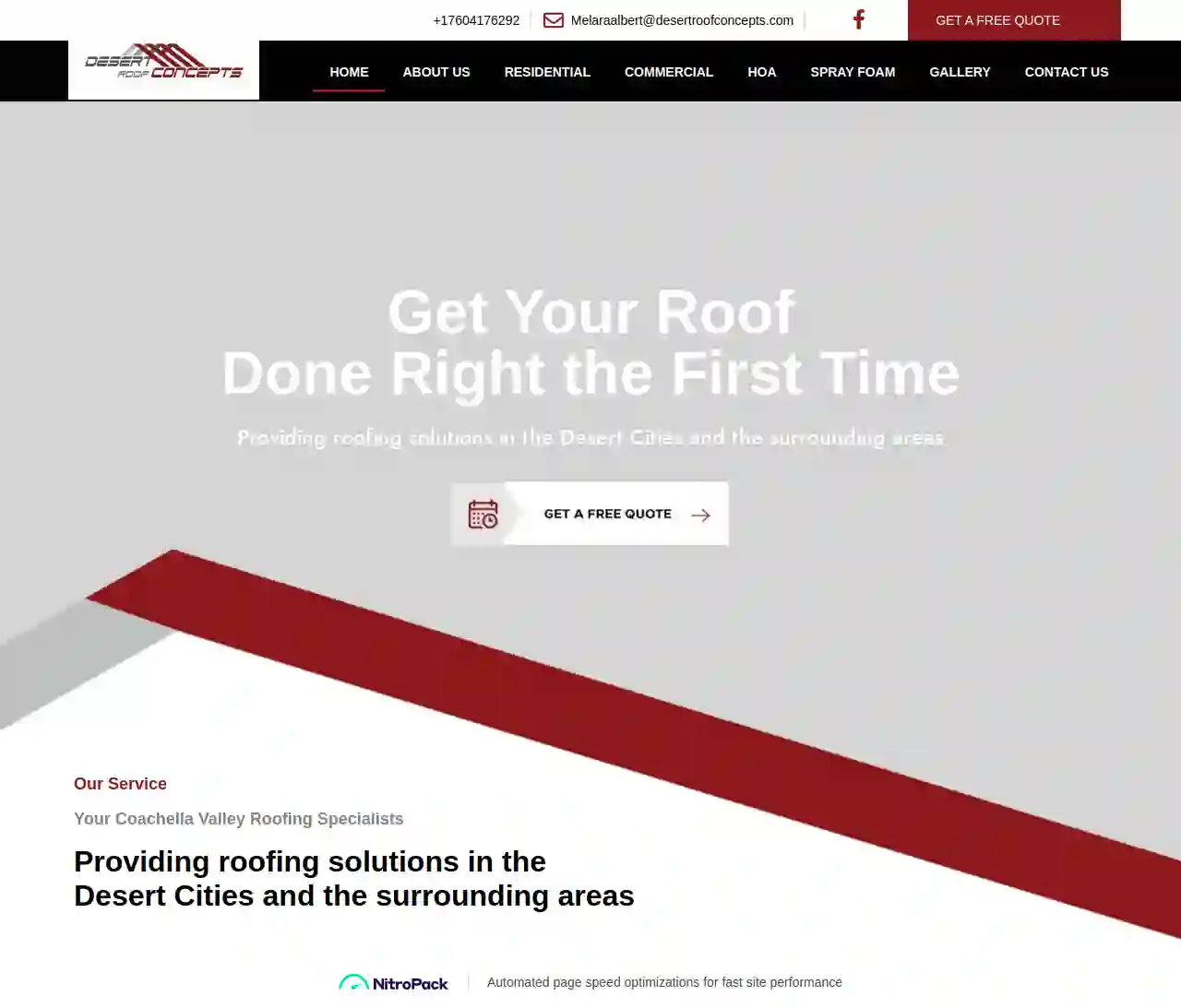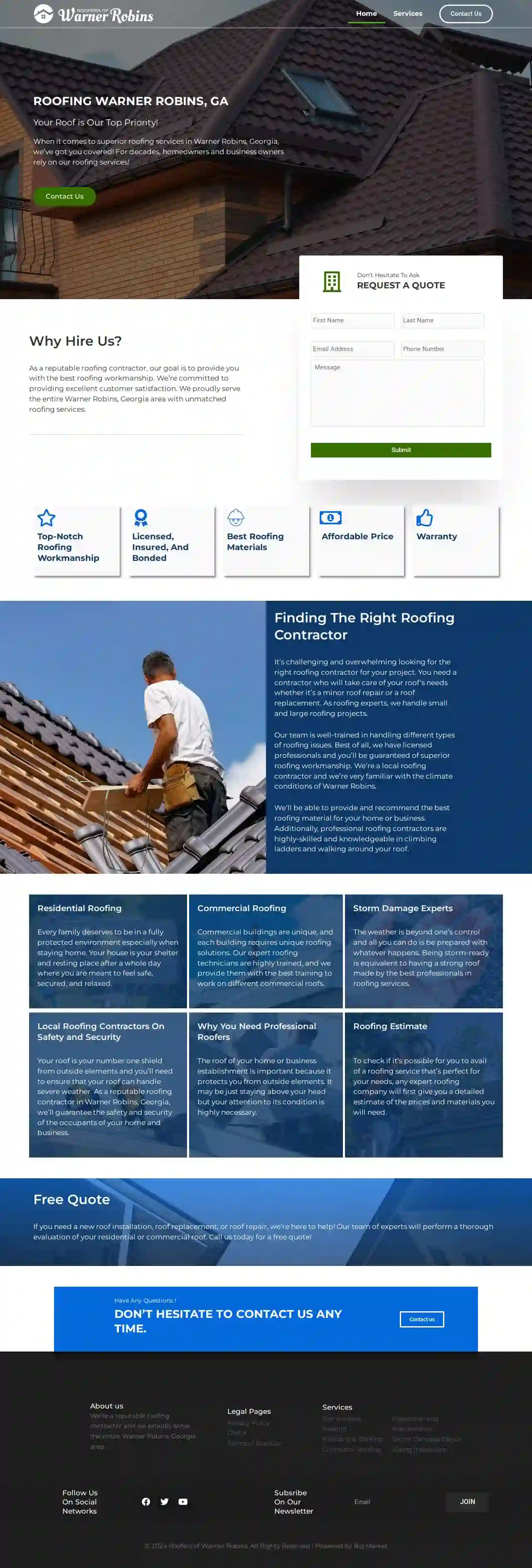Roofing Companies Norcross
Find Roofers in Norcross
Receive multiple Roofing Service quotes for your project today! Compare profiles, reviews, accreditations, portfolio, etc... and choose the best offer.

Georgia Roofing Contractors Association (GARCA)
54 reviewsAtlanta, USWelcome to GARCAGeorgia Roofing Contractors Association (formerly RSMCA) Latest News Join GARCA Today GARCA Member Directory Whether you are expanding your service offerings, looking at new solutions or just want a glimpse into how other roofing companies are dealing with the current issues, you can benefit from becoming a member of the Georgia Roofing Contractors Association. Click on the video from GARCA President, Mark Ashe with Echols Roofing, to learn more. Click HERE to download an application or below for the electronic version. Finding Tomorrow's Leaders Today by Partnering with Local SchoolsWe have got the materials and contacts to get you started today. GARCA'S Fall 2024 Scholarship is Now ClosedWe will reach out to all applicants if we have any questions or need any additional information. GARCA Scholarships - The results are in 05/15/2024 10:32 AM Betsy Rahm GARCA is Now Managed by Association Services Group 05/15/2024 10:30 AM Betsy Rahm GARCA's Fall 2023 Scholarship Program 04/21/2023 4:51 PM Betsy Rahm Get Licensed through the GARCA Voluntary Licensing Program Georgia Roofing Contractors Association’s Voluntary Licensing Program was developed to increase industry standards in Georgia by elevating roofing contractor’s knowledge, skills and professionalism through voluntary self-regulation. The license is provided through and managed by GARCA and is available to both Residential (Steep Slope) and Commercial (Low Slope) contractors. Click here to download an application and GET STARTED today! "We would like to thank the Georgia Roofing Contractor's Association for setting a standard and raising the bar for roofing contractors in Georgia. We feel much more confident when working with contractors that have met your qualifications for business and passed your examination." - Loren Barnhart, Facilities Director, Burke County Board of Commissioners Attention GARCA Residents and Commercial Members: We are excited to announce the launch of our new Voluntary Licensing Program. This program is designed to elevate the professionalism and knowledge of our members, and to provide a higher level of service to our customers. For more information, please visit our website or contact us at [[email protected]](mailto:[email protected]).
- Services
- Why Us?
- Accreditations
- Testimonials
- Gallery
Get Quote
All American Roof Pros
4.9203 reviewsMansfield, OH, 720 5th ave, 44905, USAll American Roof Pros is a family-owned business with an A+ rating from the Better Business Bureau. We provide roofing services throughout Northern Ohio, including Mansfield, OH, and surrounding areas. Our team of experts has decades of experience and promises to deliver the highest quality roofing services. We back our promise with a 12-hour guarantee, ensuring that any roofing issue is taken care of within 12 hours of initial contact. Our roofers use only the highest quality materials and have the experience to provide the highest quality roofing services. We stand behind our residential roofing projects and guarantee that our work will be the last roof you'll ever need.
- Services
- Why Us?
- Accreditations
- Gallery
Get Quote
Roof Doctors USA
58 reviewsGainesville, USWe wouldn't be here if we didn't believe in what we were doing. That's why we wake up every day eager to get to work for you. We also know that quality starts with enthusiasm for the work itself — and we love what we do. Whether you have questions about our roof leak repair, roof replacement or any of the roofing services we offer, we’re here to help. Contact us by phone or email below and if you’re ready to get started simply book your FREE Roof Inspection with our inspection form below.
- Services
- Why Us?
- Accreditations
- Gallery
Get Quote
Georgia Unlimited Roofing & Building
540 reviews2158 Elm St NE, Covington, 30014, USBuilding The Future. Restoring The Past. As a locally owned and operated company, we understand the unique needs and challenges faced by homeowners and businesses in our community. Whether you require a new roof for your home, renovations to revitalize your space, or a new construction build, our skilled team of professionals is here to deliver top-notch solutions tailored to your specific requirements. Whether you’re looking to do an addition, a renovation project, commercial project, roofing, or a new construction custom home, you have come to the right place. At Georgia Unlimited Roofing & Building we take pride in being a leading provider of roofing and construction services throughout the metro Atlanta area.
- Services
- Why Us?
- Testimonials
- Gallery
Get Quote
Tico Roofing
517 reviews104 S Belair Road Suite 5, Martinez, Martinez, GA, USTico Roofing is an experienced full-service provider of residential and commercial roofing in Augusta GA, Martinez GA and the surrounding areas. With more than eight years of experience, we can easily and accurately diagnose any roofing issue at your home or business. We provide professional roofing solutions, and we take pride in every roof our team installs. We are a small company, but we provide big satisfaction. We use only the highest quality roof products Augusta GA. We are a small business, so we understand the need to save money. Whether you need roof repair for your home or brand new commercial roofing, you will get expert work and quality material at a great price with Tico Roofing. Franchise companies offer the same pricing regardless of location, so you could be paying more than you should for the same work. Hire local roofers in Augusta GA and Martinez GA, and keep your money in the local economy. You’ll be glad you did! We love serving our community and are proud to be locally owned and operated. We love staying in touch with our customers, so don’t forget to like us on Facebook! Tico Roofing has you covered on all sides! In addition to our roofing services, we install quality vinyl siding. Our trusted and knowledgeable staff comes well equipped with many years of experience to provide you with the latest in technology and exceptional service. Your roof may be the most important part of your home. It not only protects your family and your possessions from the elements, it also protects your greatest investment – your home itself. Even a small leak can lead to big problems. Leaking water can rot boards and weaken the structural integrity of your home - potentially costing thousands of dollars in repairs. Some leaks are so small that they are not even noticeable inside the house, but they can still cause damage to the attic or the roof and can lead to the growth of dangerous mold. Your car needs regular tune-ups for top performance, and your roof does, too. If you have found a leak in your roof – or even suspect you may have one – don’t hesitate to contact us. We will send a professional to inspect your roof and provide you with a detailed report of any damage or needed repairs. We will also provide you with a written estimate for the work, so you can make an informed decision about how to proceed. At Tico Roofing, we understand the importance of making sure every customer is satisfied. That is why we use quality materials – including Owens Corning roofing products – to make sure your roofing and siding look amazing and work perfectly for a very long time. We are a member of the National Association of Home Builders and an Owens Corning Preferred Contractor. Whether you need inspection, repair, installation, replacement or any other roofing service for your home or business, contact the local roofing contractors Augusta GA at Tico Roofing today. See our work for yourself in the photo gallery. Fill out our form, and we will get back to you as soon as possible. Or call us at 706-650-2121.
- Services
- Why Us?
- Accreditations
- Gallery
Get Quote
Evans Exterior Solutions
4.211 reviewsAugusta, USWe started our roofing and remodeling journey in 1990. We’ve mastered the skills in the following fields: roofing, siding, windows, and roofing repairs. For 32 years, we have kept up with the industry standards as well as new products. We also have extensive experience in dealing with insurance claims. As far as filing a claim, then retrieving the maximum amount of compensation we are definitely the company that will go to bat for you! We treat each and every single home as if it was our own. Each project is unique and requires personal attention. Once we analyze your issues, we can explore all options to come up with efficient solutions to accommodate you. We have a wide variety of products to choose from in which we preferably avoid inferior grade materials. We employ top of the line installers on our team. Our installers must follow guidelines and specifications set up by the manufacturer as well as our personal requirements! With our extensive knowledge, experience, and resources we do our very best to satisfy every customer. Evans Exterior Solutions, LLC is your local go-to company! We are family oriented and proud of our dedicated team. We enjoy being an integral part of our community and we love working with our neighbors to produce beautifully finished projects. Honesty, Integrity, and Professionalism is our motto and we live by it! Licensed, Bonded and Fully Insured
- Services
- Why Us?
- Gallery
Get Quote
J & S Roofing and Construction Inc.
4.986 reviews5216 SW 91st Drive Ste A, Gainesville, 32608, USJ & S Roofing and Construction Inc. is a Florida State Licensed Roofing Contractor that specializes in custom metal roofs, shingle re-roofs, flat roofs, repairs, and much more. Based in Newberry and Trenton, we also proudly serve Gainesville, Alachua, and many other surrounding areas. Our number one priority is providing a quality product at a fair price with full transparency. We're a roofing company serving Gainesville, Newberry, Archer, Williston, and surrounding areas. Each of our roofing company team members is highly trained to provide top-notch roofing services, from commercial TPO roofing application to shingle roof installation. We work with standing seam metal roofs and energy-efficient roofs with radiant barriers. We're a go-to local company that offers roofing installation and repair services in Newberry, FL. Please use this form to email us today. Call (352) 672-2048 right away to speak with a roofing company representative.
- Services
- Why Us?
- Gallery
Get Quote
DESERT ROOF CONCEPTS
516 reviews77564 Country Club Dr, Suite 226, Palm Desert, 92211, USDesert Roof Concepts is a trusted professional roofer in the Coachella Valley, providing roofing solutions in the Desert Cities and surrounding areas. Our team of experts specializes in installing environment-friendly, waterproof spray foam on flat roofs, as well as shingle and tile roofs. With a focus on quality and customer satisfaction, we offer a range of services, including roof repair, maintenance, and replacement. Contact us today to schedule a consultation and get a free quote.
- Services
- Why Us?
- Our Team
- Testimonials
- Gallery
Get Quote
Amazing Grace Roofing and Contracting
2.73 reviewsWarner Robins, USRoofing Warner Robins, GA is a reputable roofing contractor proudly serving the Warner Robins, Georgia area. We specialize in a variety of roofing services, including new roof installation, roof repair, and roof replacement. Our team of experts is dedicated to providing top-notch workmanship and ensuring customer satisfaction. We are licensed, insured, and bonded, giving you peace of mind knowing you're working with a reliable and trustworthy company. We understand the importance of a strong roof for your home or business, and we're committed to protecting your investment.
- Services
- Why Us?
- Gallery
Get Quote
Atlanta Roof Repair
53 reviews785 Magnolia Way NW Suite 1306, Atlanta, 30314, USAtlanta Roof Repair is a full-service roofing company that offers a wide range of services for residential and commercial properties. We understand the importance of a safe and secure roof, and we are committed to providing excellent service with fair pricing. Our team of experts is skilled and equipped with updated training to handle all jobs, no matter the size and complexity. We offer residential roof repair, commercial roof repair, residential roof replacement, commercial roof replacement, and regular roof inspections to ensure your roof is in excellent condition. Whether you need replacement, repairs, or just an inspection, our team is just a phone call away. We are a local company that understands the value of our customers and is committed to providing the best possible service.
- Services
- Why Us?
- Gallery
Get Quote
Over 17,196+ Roofing Companies registered
Our roofing pros operate in Norcross & surroundings!
Roofyng.com has curated and vetted the Best Roofers near Norcross. Find a trustworthy business today.
Frequently Asked Questions About Roofing Companies
- Hot Climates: Opt for light-colored or reflective roofing materials to reduce heat absorption. Consider tile roofs for their thermal mass and heat resistance.
- Cold Climates: Ensure your roof has adequate insulation and ventilation to prevent ice dams and moisture buildup. Metal roofs can shed snow effectively.
- High-Wind Areas: Choose roofing systems with high wind ratings and properly installed hurricane straps or clips to enhance wind resistance.
- Areas with Heavy Rainfall: Ensure your roof has proper drainage and a waterproof membrane to prevent leaks.
- Experience: 'How long have you been in business, and what experience do you have with my type of roof?'
- Licensing and insurance: 'Are you licensed and insured, and can I see proof of coverage?'
- Warranties: 'What warranties do you offer on your work and the materials used?'
- References: 'Can you provide references from past clients?'
- Project Timeline: 'What is the estimated timeline for completing the project?'
- Payment Terms: 'What are your payment terms, and do you require a deposit?'
- Communication: 'How will you keep me updated on the project's progress?'
- Cleanup: 'What steps will you take to protect my property during the project and ensure proper cleanup afterward?'
- Metal roofs: Reflect sunlight, reducing cooling costs.
- Tile roofs: Offer thermal mass, regulating temperature.
- Cool roofs: White or light-colored roofs with high solar reflectance.
- Green roofs: Vegetated roofs providing insulation and reducing heat absorption.
How do I choose the right type of roof for my climate?
What questions should I ask a roofing contractor?
What is the difference between a roofer and a general contractor?
Roofer: Specializes in roof installations, repairs, and replacements. They have expertise in roofing materials, techniques, and safety practices specific to roofing.
General Contractor: Oversees and manages entire construction projects, including hiring and coordinating subcontractors, such as roofers, electricians, plumbers, etc. They handle overall project planning, scheduling, and budgeting.
For roofing projects, it's generally best to hire a roofing contractor who specializes in roof work.
What are some energy-efficient roofing options?
How do I choose the right type of roof for my climate?
- Hot Climates: Opt for light-colored or reflective roofing materials to reduce heat absorption. Consider tile roofs for their thermal mass and heat resistance.
- Cold Climates: Ensure your roof has adequate insulation and ventilation to prevent ice dams and moisture buildup. Metal roofs can shed snow effectively.
- High-Wind Areas: Choose roofing systems with high wind ratings and properly installed hurricane straps or clips to enhance wind resistance.
- Areas with Heavy Rainfall: Ensure your roof has proper drainage and a waterproof membrane to prevent leaks.
What questions should I ask a roofing contractor?
- Experience: 'How long have you been in business, and what experience do you have with my type of roof?'
- Licensing and insurance: 'Are you licensed and insured, and can I see proof of coverage?'
- Warranties: 'What warranties do you offer on your work and the materials used?'
- References: 'Can you provide references from past clients?'
- Project Timeline: 'What is the estimated timeline for completing the project?'
- Payment Terms: 'What are your payment terms, and do you require a deposit?'
- Communication: 'How will you keep me updated on the project's progress?'
- Cleanup: 'What steps will you take to protect my property during the project and ensure proper cleanup afterward?'
What is the difference between a roofer and a general contractor?
Roofer: Specializes in roof installations, repairs, and replacements. They have expertise in roofing materials, techniques, and safety practices specific to roofing.
General Contractor: Oversees and manages entire construction projects, including hiring and coordinating subcontractors, such as roofers, electricians, plumbers, etc. They handle overall project planning, scheduling, and budgeting.
For roofing projects, it's generally best to hire a roofing contractor who specializes in roof work.
What are some energy-efficient roofing options?
- Metal roofs: Reflect sunlight, reducing cooling costs.
- Tile roofs: Offer thermal mass, regulating temperature.
- Cool roofs: White or light-colored roofs with high solar reflectance.
- Green roofs: Vegetated roofs providing insulation and reducing heat absorption.